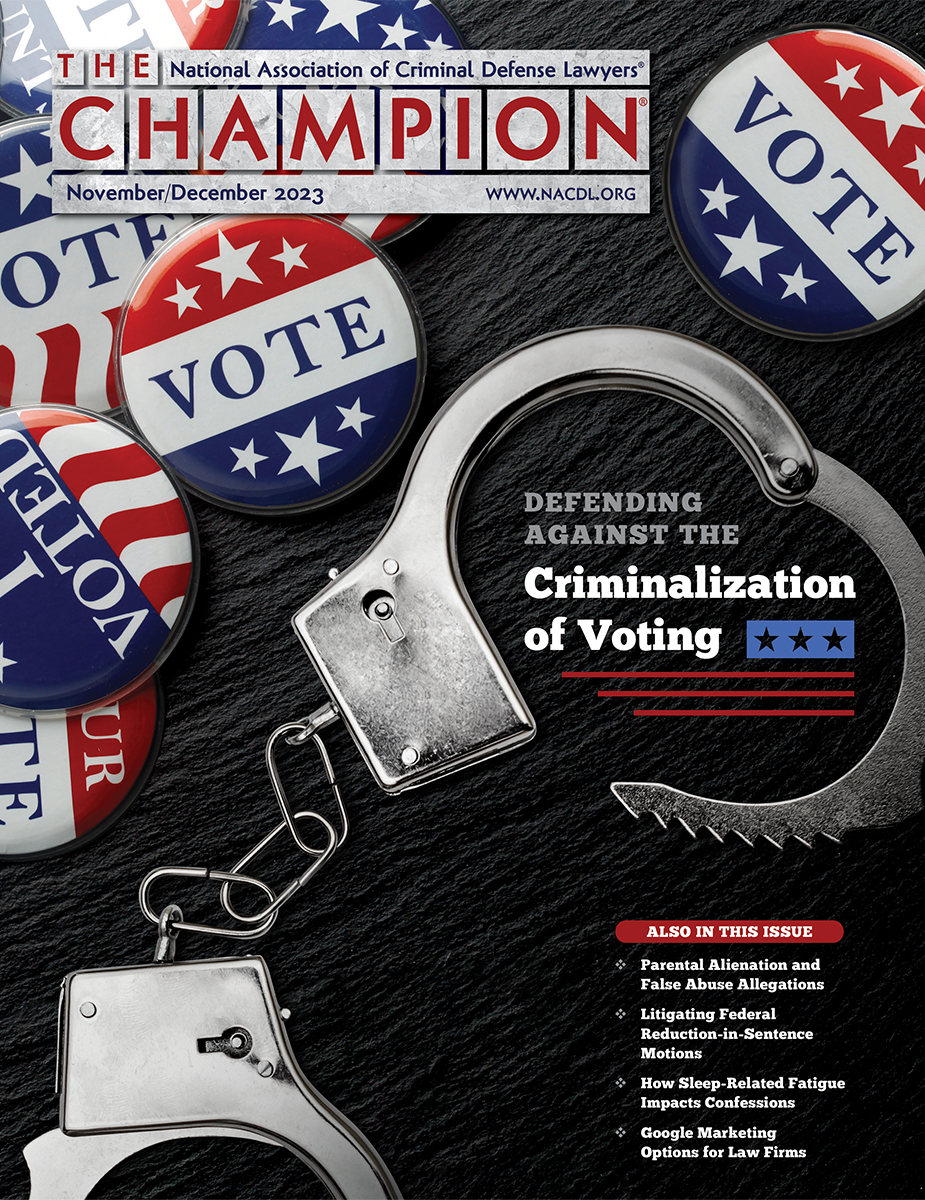November/December 2023

Learn how to build a strong defense when people vote or register to vote in good faith, but the government charges them with violating election laws.
Articles in this Issue
-
ABCs of Parental Alienation for Attorneys Who Defend False Allegations of Abuse
Parental alienation is a pathological dynamic in which one parent strives to sever a child’s relationship with the other parent. For example, in a contentious custody battle, allegations of abuse can be initiated by a child at the behest of an alienating parent. Evidence of parental alienation is central to establishing a motive for the child’s allegations. How can defense counsel uncover parental alienation in a criminal case?
-
Affiliate News
What events are NACDL affiliates hosting this month? Find out here.
-
Book Review: Adelson’s The Pathology of Homicide by Dr. James R. Gill
This month Lakshmanan Sathyavagiswaran reviews Adelson’s The Pathology of Homicide: A Guide for Forensic Pathologists and Homicide Investigators by Dr. James R. Gill.
-
Defending Against the Criminalization of Voting
People with past felony convictions have been prosecuted for registering to vote, casting ballots, or seeking to register while ineligible. It seems that the purpose of these prosecutions is to intimidate eligible voters with past felony convictions and keep them away from the ballot box. Democracy needs champions to defend people who acted in good faith but are being prosecuted for violating election laws. Voting rights restoration expert Blair Bowie offers tips that may help build a strong defense.
-
Digital Age & Practice: Marketing Through Google Options
Google dominates the search engine market. Jay Ruane explores the different Google marketing options available and explains how they can be used to market a criminal defense law firm.
-
From the President: Dr. King Knew the Power of Redemption
Issues that resonated in the 1950s – including the struggle for civil rights and racial justice – still occupy us today. One of the things that inspires us to continue fighting for justice is our confidence in the power of redemption.
-
How Sleep-Related Fatigue Impacts the Evidentiary Value of Statements and Confessions
The impact of fatigue on defendants and their statements can be consequential. The most well-known examples come from false confession cases, where suspects (subsequently exonerated) were convicted based on fabricated statements provided under extreme fatigue and duress. Zlatan Križan and Richard A. Leo discuss sleep deprivation and its effects, and they analyze how sleep deprivation and fatigue can undermine the voluntariness and reliability of statements and confessions.
-
Litigating Federal Reduction-in-Sentence Motions: The New Legal Landscape
The United States Sentencing Commission updated U.S.S.G. § 1B1.13, the policy statement that governs federal reduction-in-sentence motions filed pursuant to 18 U.S.C. § 3582(c)(1)(A). The legal hook for a reduction-in-sentence motion is identifying one or more “extraordinary and compelling” reasons that warrant relief. The authors provide tips for litigating § 3582(c)(1)(A) motions – both the extraordinary and compelling prong and the § 3553(a) prong.
-
NACDL News: NACDL Applauds U.S. Sentencing Commission Vote on Retroactive Reduction
for Many Incarcerated Individuals
NACDL News for November/December 2023
-
NACDL News: Nation’s Criminal Defense Bar Bestows Champion of Justice Awards at Redemption Gala
NACDL News for November/December 2023
